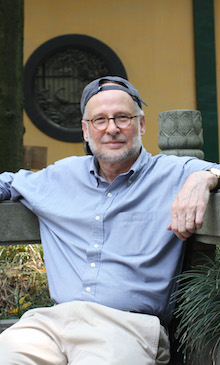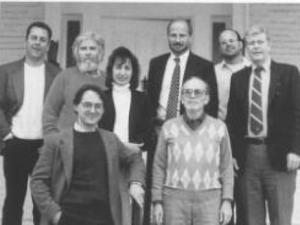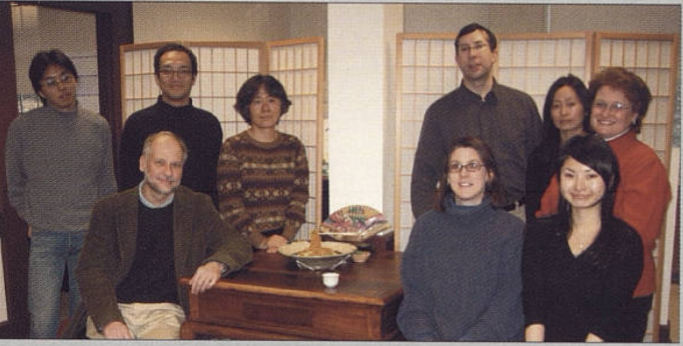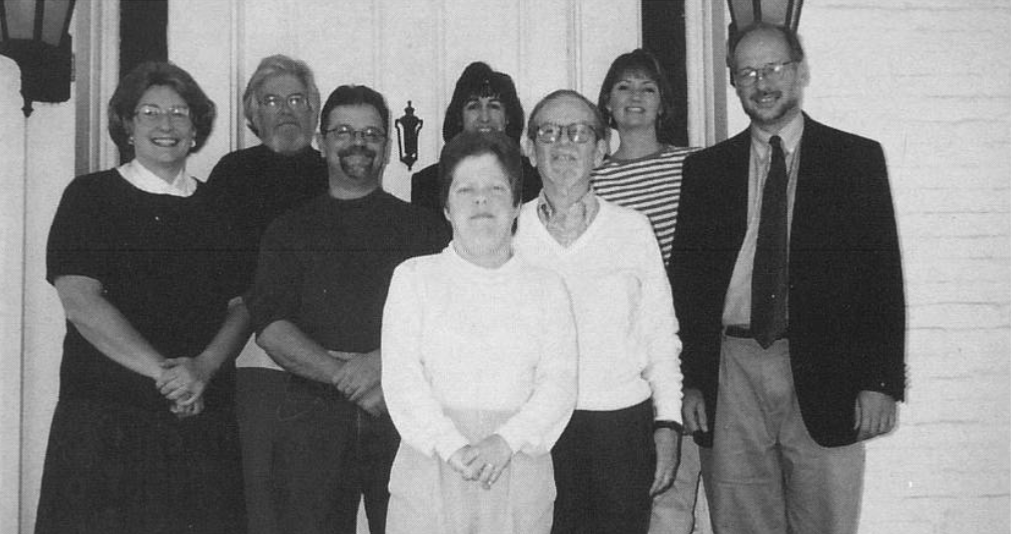
Associate Professor of Political Science Fritz Gaenslen in Hangzhou, China (Photo courtesy of Gettysburg College)
By Benjamin Pontz, Editor-in-Chief
When Fritz Gaenslen was in first grade, the school nurse discovered that he had moderately severe hearing loss. He began to sit in the front row of all of his classes, and, in time, he became a voracious reader. By junior high school, he realized that he had a deep interest in learning how other people lived. That “romantic adolescent interest” stayed with him, and, by the time he was in college, in the aftermath of the Vietnam War, Asia became the subject of his intense fascination.
For the past 38 years, Gaenslen has pursued that fascination as a faculty member at three different colleges teaching political science, a subject he chose over literature because, he quipped, he was raised with a certain degree of Protestant guilt that cautioned him from choosing a field that would be too much fun.
“At my core, my soul, I am a liberal arts undergraduate,” he said. “I love the learning, and I love being able to share that.”
Gaenslen, 73, will retire this spring after 29 years on the faculty of Gettysburg College in the Department of Political Science and as one of the founding members of the college’s East Asian Studies program.
“At my core, my soul, I am a liberal arts undergraduate.”
– Fritz Gaenslen
Gaenslen began graduate school at the University of Michigan thinking he might become a specialist in Burma, but he quickly pivoted to China and developed an appreciation for the tools that social science provided to help understand the world. He studied at Michigan with Robert Putnam, now a retired Harvard professor and one of the most-cited political scientists of all time. Even before finishing his PhD, Gaenslen found a faculty job at the now-defunct American College of Switzerland, where he taught for two years. He then spent seven years at the University of Vermont. While at Vermont, he met Kathy Iannello, who, at the time, was a graduate student working on her dissertation research. She recalls that Gaenslen helped her navigate the academic job market, and, just one year after she took a tenure-track job at Gettysburg College to teach American politics, a position teaching comparative politics opened.

Gaenslen (standing in middle back with suit) in the 1993 political science department photo (Photo courtesy of Spectrum Yearbook)
“I was very happy that Fritz decided to apply for the job, and that he accepted our offer,” Iannello, now an associate professor of political science, recalled. “Fritz has always been thoughtful, fair-minded and one of the best trained political scientists I have ever known.”
It was 1991 when Gaenslen joined the Gettysburg College faculty. He says he arrived at a time when the college was at the beginning of an upward swing that has lasted ever since.
“It’s great to be at a place where, in the atmosphere, you have a sense that it’s upbeat and it’s improving,” he said.
He quickly became plugged into the campus community, leading what were then called service-learning trips (and are now known as immersion projects) through the Center for Public Service to Nicaragua and Peru.
But it was to the area in which he specialized and taught, East Asia, that Gaenslen would turn his attention in the mid-1990s and help to build a program. He remembers that, in his first year on the faculty, no one taught a single course about China or Japan. When a petition began to circulate advocating that the college do something about that, he signed his name, and, before long, he found himself appointed chairperson of a committee to explore the possibility of starting an Asian Studies program at the college. He was quick to note that, while the program’s growth into a department that offers two majors, one centered on China and one centered on Japan, is a source of gratification, he does not want to take credit for the creation of what is, today, the East Asian Studies department at Gettysburg College. His impact on its development, though, is undeniable.
“Looking back, I think his arrival was a real turning point for the development of the Political Science Department as well as East Asian Studies.”
– Kathy Iannello
“Looking back, I think his arrival was a real turning point for the development of the Political Science Department as well as East Asian Studies,” Iannello recalled. “Fritz brought a breadth of knowledge and experience that was vital then, as it still is now.”
It should come as no surprise that Gaenslen would be an unassuming yet driving force on the development of an interdisciplinary program that studies Asia. Over the years, Gaenslen has viewed teaching as an excuse to continue to learn.
“I like everything I teach in part because it gives me an excuse to keep learning about and making sense of things,” he said. “The world keeps changing, so it keeps asking you to catch up and make sense of what’s going on, and I have liked that invigorating part of it.”

Gaenslen (seated at left) with the East Asian Studies faculty in 2007 (Photo courtesy of Spectrum Yearbook)
Professor of Political Science Caroline Hartzell, whose office is next door to Gaenslen’s and who credits Gaenslen as one of her principal mentors, noted that he spends hours upon hours reading troves of material in search of the perfect books to challenge students to think comparatively, to expose them to good writing, and to ignite a passion for further exploration.
“That was also just a vehicle for him to become more educated and for him to see what had been written,” she said, adding that she now finds herself in frequent search of “Fritzian books” for her own classes. Hartzell also noted that Gaenslen does “heroic” work helping students develop as writers.
“He spends hours reviewing drafts of papers with students in his office and follows that up with copious comments on their final papers,” she said.
One of those students was Lindsay Reid, who graduated from Gettysburg in 2011 and now is one of Gaenslen’s colleagues, having joined the faculty last fall.
She said that Gaenslen’s insistence that writing be done in a way that “your grandmother would understand it” sticks with her to this day.
“I always appreciated his thorough feedback on papers, which broke me of a few bad writing habits,” she said.
But the essence of what has made Gaenslen such a compelling teacher seems to lie in the fact that he has such an interest in learning himself.
For Anthony Wagner ’17, Gaenslen’s drive to better understand what he called “far away and exotic places” was contagious. Coming from a family of farmers in rural Pennsylvania, Wagner said that he, too, found himself keenly interested in better understanding the world around him. Gaenslen animated that world not through flashy technological presentations — he writes notes on the chalkboard, avoids PowerPoints, brings newspaper cutouts and paper maps to class, and has even pulled out a slide projector — but through what Wagner called “master story tell[ing].”
“He made these places and people come alive, long before I ever boarded a plane,” said Wagner, who has studied abroad in South Africa, taught English in China, completed two years with the Fulbright program in Brazil, and is now, inspired by Gaenslen, headed to graduate school. “As I look back on all of these moments, I realize that what made Professor Gaenslen such an influential character during my time at Gettysburg is his ability to listen. When he does give advice, it is thoughtful and supportive. I have always had a strong sense that he believes in my potential and abilities. What more can you ask for?”
“He has always held before us the vision of what a liberal arts education is and should be.” – Caroline Hartzell
That ability to listen and lend thoughtful advice has helped Gaenslen to shape the political science department, which has no shortage of large personalities that, at times, have different ideas about what the department ought to do.
“He has always held before us the vision of what a liberal arts education is and should be,” said Hartzell. “That has been true through some difficult times in the department. He has been sort of a touchstone point who could bring clashing personalities around.”
When the department discussed the future of its political theory track after the retirement of Professor Donald Tannenbaum, it was Gaenslen, Hartzell said, who made the case that political thought is part of a liberal arts education in political science. The track remains in place, and a new tenure-track assistant professor of political thought will begin this fall.
“He has always been this steady, thoughtful presence,” she said. “That doesn’t mean he doesn’t have strong points of view and advocate them, but he always, always has the best interests of the students at heart.”
Gaenslen has been a ubiquitous presence, five days a week, in Glatfelter Hall, and his steadiness has been a source of consistency on which others rely.
Assistant Professor of Political Science Scott Boddery recalled that, during his very first visit to Gettysburg College as a job candidate, Gaenslen laid the groundwork for Boddery’s appreciation of the college to this day.
“Fritz was the first person I met when I interviewed at Gettysburg. We sat down to eat breakfast together and the waitress looked at him and asked, ‘the usual?’ Over the next hour, Fritz chipped away at his eggs benedict while telling me about the college and the community,” said Boddery. “This conversation set the tone for my entire visit, and so much of what he told me rings true today. This is a remarkable community, and I want Fritz to know that he played an oversized role in making it so.”
“I’ll dearly miss being able to walk down the hallway and tap into Fritz’s wisdom and clarity of mind,” Boddery added. “What he’s taught me about being an engaged member of the Gettysburg community will remain with me, no doubt as I convey his lessons to other newcomers over a plate of eggs benedict.”
Reid, who has now been able to join her former professor as a colleague for the last year, said she feels “incredibly lucky” to have worked with him even if only for a semester and a half.
“I’ve enjoyed our conversations in the hallways of Glatfelter thanks to his humor, kindness, and intense intellect, and I will miss seeing and learning from him daily,” she said.

Gaenslen (far right) with his political science colleagues in 2000 (Photo courtesy of Spectrum Yearbook)
For the past six weeks, a man who has eschewed technology in favor of face-to-face interactions in which he reads lips to help compensate for his hearing loss has taught his classes by delivering lectures through Zoom from his home in Gettysburg. His students, he said he has realized, are “more essential to my emotional well-being than I thought,” and finishing his career without them runs contrary to what he has most appreciated about Gettysburg College.
During a recent congratulatory video the political science faculty made for graduating seniors, Gaenslen had the last word. In a brief, poignant message, he said that, while he has long appreciated a great deal about the college community, being away for these final few weeks has led him to the conclusion “that there is one single best thing about Gettysburg College: it’s you, the students.” No fewer than five graduating seniors have since mentioned that the message made them tear up.
For Gaenslen, teaching at a residential liberal arts college has been an experiential endeavor, one that has confirmed, to him, that “a liberal arts education is the best kind of education for making your way through life.”
And while in retirement, he says he has plans to swim laps at the college pool, play tennis with fellow retirees at the college tennis courts, and take walks around campus, Fritz Gaenslen, the lifelong reader with an insatiable appetite to better understand how other people live, said he also plans to spend a fair amount of time in the college library.
“There are some things I’d like to learn about.”

June 6, 2021
Please pass my congratulations on to Fritz from Eddie Fei his old tennis partner!